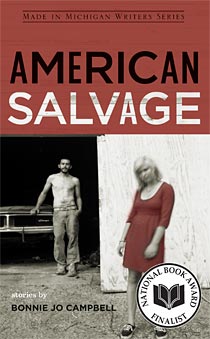 Each day leading up to the March 11 announcement of the 2009 NBCC award winners, Critical Mass highlights one of the thirty finalists. Today, NBCC board member Karen Long discusses fiction finalist Bonnie Jo Campbell's American Salvage (Wayne State University Press)
Each day leading up to the March 11 announcement of the 2009 NBCC award winners, Critical Mass highlights one of the thirty finalists. Today, NBCC board member Karen Long discusses fiction finalist Bonnie Jo Campbell's American Salvage (Wayne State University Press)
In American Salvage, Bonnie Jo Campbell takes the rural Michigan elements of a country song—scarce money, hard liquor, beat-up lives, and battered trucks—and spins them into literature.
Her 14 gritty stories are a revelation, funny and risky, as characters fret over Y2K, fall for the wrong partners, and drop the tailgate on the Ford to sit down. These tales are populated by people who know their way around Marlin rifles, restraining orders, and pig manure. In spry, economical prose, Campbell gives them all a powerful gravitational pull.
The first story, “Trespasser,” accomplishes more in 13 paragraphs than many a novel does in 300 pages. It opens as a family discovers their vacation cabin has been used to cook methamphetamine. As they bunch on the front porch, a “curly-haired blonde departs unseen through the back door.” The piece cuts us with its contrast between the family daughter, mouth aglitter with braces, as she “inhales the scent of the crime,” and the addicted girl, just three years older, who already stinks of ruination.
The “faint ammonia smell” of meth permeates four other stories, including “The Solutions to Brian’s Problem,” in which the title character contemplates seven alternatives to his wife’s addiction, made more complicated by their infant son. This story is another small miracle of distillation, a world in seven paragraphs.
Campbell is smart enough to vary the temperature and to salt her stories with humor. Three of them end on hard-won, tender notes. In “Falling,” the narrator tells us, “I’m twenty years older than he is and getting fat; I’ve never been anything to look at, but he’s been lonely, and there was a time, not long ago, when I wasn’t turning him away.”
The author, who lives near Kalamazoo and farms hay, has a way of getting the lonesome, inchoate churning of rural men on the page that will remind readers of Annie Proulx’s work. It gleams especially in “Yard Man,” in which a salvage yard worker yearns to save his marriage, and in her award-winning story, “The Inventor, 1972.”
Then, in “Family Reunion,” a single sentence—“She had to do this thing for herself; nobody is going to do it for her”—lets the reader realize a 14-year-old is going to take violent revenge on an uncle, a revelation that packs the kick of a rifle butt.
While much of the country was thrilling last year to the giddy new television hit, Glee, set in rural Ohio, American Salvage arrived. Its pages contain a much more authentic song of the Midwest.
Much praise, then, to Bonnie Jo Campbell and Wayne State University Press, a small operation in Detroit, for giving us a chance to hear it.


